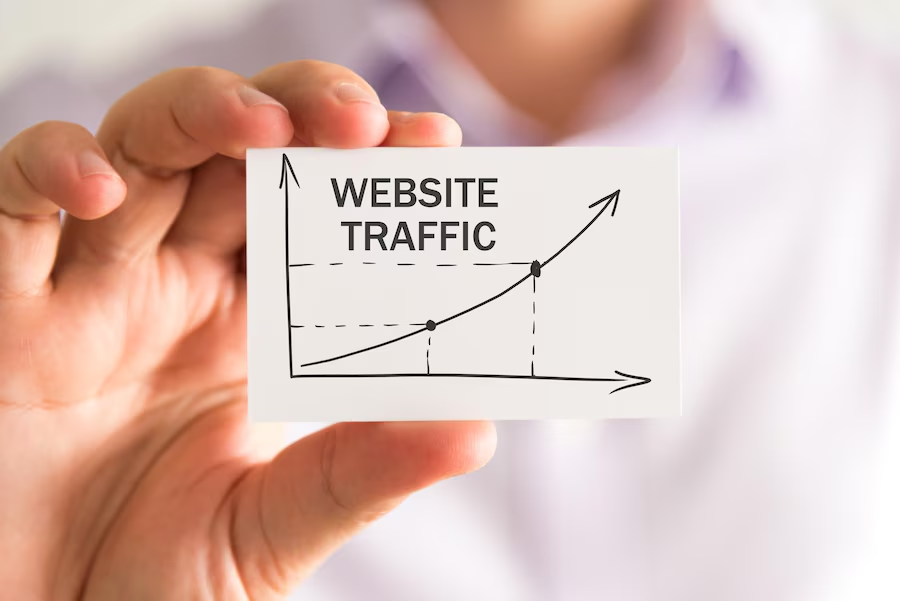Did you know?
Did you know that 75% of users never scroll past the first page of search results? This means if your business isn’t ranking on that coveted first page, you’re missing out on a massive pool of potential customers!
In today’s digital-first world, SEO (Search Engine Optimization) isn’t just a marketing tool—it’s an essential business strategy. Whether you’re a startup or an established enterprise, SEO can make or break your online visibility, driving the organic traffic that leads to higher conversions and long-term growth.
So, what exactly is SEO?
At its core, SEO is the process of optimizing your website to rank higher in search engine results pages (SERPs), like Google. It’s about making your content more discoverable and relevant to users, ensuring that when people search for the products or services you offer, they find you first. Simply put, SEO helps you attract and engage the right audience—without paying for ads!
Increased Visibility and Organic Traffic
Search Engine Dominance:
It’s no secret that search engines, especially Google, are the go-to tool for anyone looking to discover products, services, or answers to their questions online. In fact, studies show that over 90% of online experiences start with a search engine. This means if you’re not showing up when people search for what you offer, you’re invisible to your potential customers. Simply put, without SEO, your business might as well be lost in cyberspace.
Top Search Results Matter:
It’s not just about showing up—it’s about where you show up. Data consistently reveals that over 60% of all clicks go to websites that appear in the top 3 search results. The higher you rank, the more visibility your business gets, and the more likely people are to click through to your site. Ranking on the first page means increased exposure, which directly translates to higher traffic. The difference between ranking #1 and #10 can mean thousands of additional visitors each month—and that could be the key to scaling your business.
Long-Term Traffic Gains:
While paid advertising offers immediate results, it’s a temporary solution. The moment your ad runs out, your traffic stops. SEO, on the other hand, builds sustainable, long-term traffic that continues to grow over time. As your website gains authority and ranks higher, it becomes a reliable source of organic visitors. These visitors are also more likely to convert because they’ve found you through a search, indicating they’re actively looking for what you provide, rather than being interrupted by an ad.
Local SEO Benefits:
For businesses that operate in specific geographic areas, local SEO is a game-changer. With local searches making up nearly 50% of all mobile queries, it’s crucial for local businesses to show up in search results when customers are looking for nearby services or products. Local SEO strategies, like optimizing your Google My Business profile and gathering local reviews, help you capture traffic from people in your neighborhood or region. Whether you’re a coffee shop, a plumber, or a law firm, local SEO ensures you’re not just competing on a global scale, but also in your immediate community.
Building Credibility and Trust
Trust in Organic Results:
Trust is one of the most valuable currencies in today’s digital world, and it plays a central role in SEO. Studies show that 70-80% of users actively ignore paid ads and instead focus on organic search results. Why? Over time, consumers have become more skeptical of paid advertisements, perceiving them as biased and self-serving. They know that businesses pay to be featured in ads, but the organic results represent websites that have earned their place through relevance, authority, and user value. Organic rankings are seen as a badge of credibility, indicating that your business has provided genuine value that search engines have recognized. When your website ranks highly for relevant keywords, it signals to users that your business is not only visible, but also trustworthy and an authoritative source in your field. This credibility boosts your reputation and encourages potential customers to engage with your brand more confidently.
Effective Use of SEO Strategies:
SEO is about much more than just driving traffic—it’s about building trust with both search engines and your audience. Here are key strategies that contribute to this credibility:
- Quality Content:
Content is at the heart of SEO, and its quality can either elevate or diminish your online credibility. Search engines prioritize informative, well-structured, and relevant content that answers users’ questions. By providing valuable resources, like blog posts, how-to guides, and in-depth product descriptions, you not only increase your rankings but also establish your brand as a trusted expert. Well-crafted content that addresses user needs fosters long-term relationships and positions your business as a go-to authority in your industry. - Backlinks:
Backlinks, or incoming links from other reputable websites, are another powerful way to build credibility. When a well-known, trusted site links to your content, it’s like receiving a vote of confidence. Search engines see these links as evidence that your website is authoritative and relevant, which boosts both your rankings and your reputation. Quality backlinks also improve your domain authority, signaling to both users and search engines that your site is credible and deserving of a top spot in search results. The more high-quality sites that link to your content, the more trust you earn from both search engines and users. - On-Page Optimization:
On-page optimization is the backbone of a well-structured website. Elements such as optimized titles, meta descriptions, and clear headers not only help search engines understand the content of your pages but also improve the user experience. A website that is easy to navigate, fast to load, and mobile-friendly increases user engagement and reduces bounce rates, which are critical signals to search engines. Proper on-page SEO ensures that your site is seen as a reliable resource, boosting its credibility both with users and search engines. When your website is well-organized and optimized, users can find the information they need quickly, building trust in your brand’s ability to deliver on its promises.
Case Study/Example:
Let’s look at the example of a local bakery that embraced SEO to enhance its credibility and trust within the community. Initially, the bakery relied on word-of-mouth marketing, but as it optimized its website, the results were transformative. They started by creating a blog with baking tips, sharing helpful advice about ingredients, recipes, and trends in the baking world. They also showcased customer reviews prominently on their site, allowing potential customers to see real feedback from happy patrons. Additionally, the bakery optimized its Google My Business profile, ensuring they appeared in local searches for terms like “best bakery near me.” These small but impactful SEO strategies led to an increase in local search rankings, with more customers discovering the bakery online. Not only did this boost web traffic, but the visible expertise, positive reviews, and increased local presence also built trust with the community. As a result, the bakery saw an increase in both online orders and foot traffic to their store. Their investment in SEO not only helped them rank higher but also cemented their reputation as a trusted and beloved business in their local area.
Cost-Effective Marketing
Comparing SEO to Paid Advertising:
Paid advertising, such as Google Ads or social media ads, can provide quick visibility and immediate results. However, this comes with a cost: you need to continuously pay to keep your ads running. As soon as your budget runs out, your traffic stops. SEO, on the other hand, may take longer to show results but offers a more cost-effective and sustainable way to generate traffic. By optimizing your website and content, you can attract organic visitors without spending on ads, making SEO a long-term investment that pays off over time.
Better ROI:
When comparing SEO to traditional advertising methods like print or TV, the return on investment (ROI) from SEO is often far superior. While print ads and TV commercials can be expensive with uncertain results, SEO is based on strategic optimization of your website, meaning you’re investing in something that can continually attract customers without needing to renew the campaign. SEO’s long-term benefits can lead to a higher ROI because you don’t need to keep pouring money into it. Once your website ranks well, it can bring in consistent traffic, often outperforming expensive traditional ads.
Sustainability:
One of the biggest advantages of SEO is its sustainability. Once your website has been optimized and starts ranking for relevant keywords, it can continue to generate traffic without ongoing costs. Unlike paid ads, where every click costs you money, SEO helps build long-lasting visibility. It’s an investment that keeps giving back over time. As your website’s authority grows, your organic traffic can increase, providing a steady flow of visitors without the need to continually fund ad campaigns.
Competitive Advantage
Outperform Competitors:
Businesses that invest in SEO often have a clear edge over competitors who ignore it. By consistently ranking higher in search results, you’ll capture more visibility, traffic, and ultimately, customers.
SEO as a Market Differentiator:
Ranking above competitors not only drives more traffic, but it also positions your brand as the go-to authority in your industry, helping you stand out in a crowded marketplace.
Adapting to Algorithm Changes:
Search engines are always evolving, and businesses that stay ahead of algorithm changes by continuously adapting their SEO strategies gain a significant competitive advantage. This proactive approach ensures your website remains relevant and maintains top rankings.
Better User Experience
User-Centric Design:
SEO isn’t just about ranking higher—it’s about creating a better experience for your visitors. Optimizing for fast load times, mobile responsiveness, and easy navigation makes your site more user-friendly, keeping visitors happy and engaged.
Lower Bounce Rate:
By improving user experience, SEO helps reduce bounce rates. When visitors stay longer and engage more, search engines take notice, which can boost your rankings.
Mobile Optimization:
With mobile traffic surpassing desktop, having a mobile-friendly website is a must. Not only does it improve user experience, but it also directly impacts your SEO, helping you rank higher in mobile search results.
Measurable Results
Data-Driven Decisions:
SEO gives you clear, trackable results. Using tools like Google Analytics, you can measure traffic, see what’s working, and adjust strategies to drive even better outcomes.
Tracking Conversions:
SEO allows you to track key actions—whether it’s lead generation, sales, or sign-ups—so you can measure your ROI and optimize for higher conversions.
SEO Tools and Reporting:
Essential tools like Google Search Console, Ahrefs, and SEMrush provide valuable insights into your SEO performance, helping you refine your approach and stay ahead of the competition.
Enhances Brand Awareness
SEO Boosts Content Visibility:
The higher your content ranks for relevant keywords, the more discoverable your brand becomes, attracting new customers.
Social Proof & Brand Recognition:
Appearing frequently in search results builds trust and establishes your brand as a recognized authority, boosting credibility and relevance.
Case Study/Example:
For example, a local fitness center that optimized its website for SEO saw a dramatic increase in visibility, attracting a steady stream of new clients. By consistently ranking for keywords like “best gym in [city]” it became the go-to choice in the area, significantly growing its customer base.
Adaptability and Scalability
Flexible for Various Business Types:
No matter your business size—whether you’re a small startup or a global corporation—SEO strategies can be customized to fit your unique needs and goals, making it accessible and effective for all.
Scalable Growth:
As your business grows, so can your SEO efforts. Whether expanding into new markets, launching more products, or targeting global audiences, SEO scales seamlessly to support your growth.
Future-Proofing:
SEO isn’t static; it evolves. As search algorithms and user behavior change, your SEO strategy adapts to keep you relevant and ahead of the competition, ensuring your online presence remains strong for years to come.
SEO: Your Key to Sustainable Growth and Competitive Advantage
In today’s competitive digital landscape, SEO is no longer optional—it’s a critical business strategy. From increasing your online visibility and driving organic traffic to building credibility and trust, SEO offers powerful, long-term benefits. It provides a cost-effective alternative to paid advertising, enhances user experience, and allows businesses to scale with ease. With measurable results and the ability to adapt to changing trends, SEO ensures that your brand remains visible, relevant, and ahead of the competition.
Investing in SEO isn’t just about ranking higher—it’s about securing sustainable growth and establishing your brand as a trusted authority. So, whether you’re just starting or scaling your business, embracing SEO will give you the competitive edge you need to succeed in the digital age.
Ready to Build Trust and Boost Your Online Presence?
At ML Digital Marketing, we specialize in crafting SEO strategies that not only drive traffic but also build long-lasting credibility and trust for your business. Whether you’re looking to enhance your website’s visibility, improve user engagement, or establish yourself as an authority in your industry, our team is here to help you succeed.
Don’t let your competitors outshine you—contact us today to learn how we can take your brand to the next level with proven, results-driven SEO strategies!
FAQs
1. Why is trust important in SEO?
Trust is crucial because consumers tend to trust organic search results more than paid ads. Ranking higher for relevant keywords signals to users that your website is credible, reliable, and authoritative in your field.
2. How can SEO improve my brand’s credibility?
By creating quality content, gaining backlinks from reputable sources, and optimizing your website for user experience, SEO helps establish your brand as an expert, building both trust with users and authority with search engines.
3. What are backlinks and why are they important?
Backlinks are links from other reputable websites to your content. They act as a vote of confidence, signaling to search engines that your website is credible, which can boost your rankings and reputation.
4. How can SEO help my local business gain trust?
Optimizing for local SEO—such as improving your Google My Business profile and creating relevant local content—can help your business rank higher in local searches, making your brand more visible and trustworthy to nearby customers.
5. Can SEO provide measurable results?
Yes! With tools like Google Analytics and Google Search Console, you can track key metrics, including traffic, rankings, and conversions, to see how your SEO efforts are building trust and driving results.








